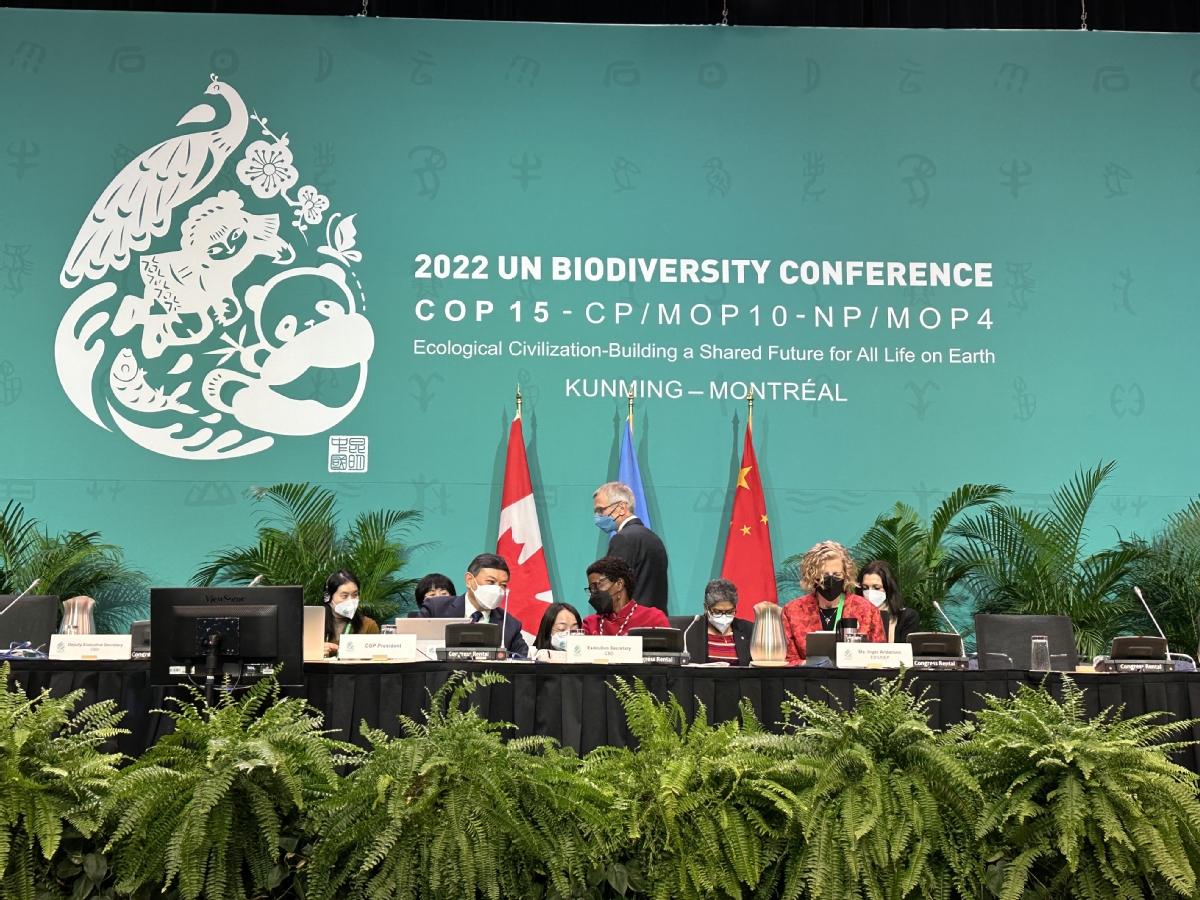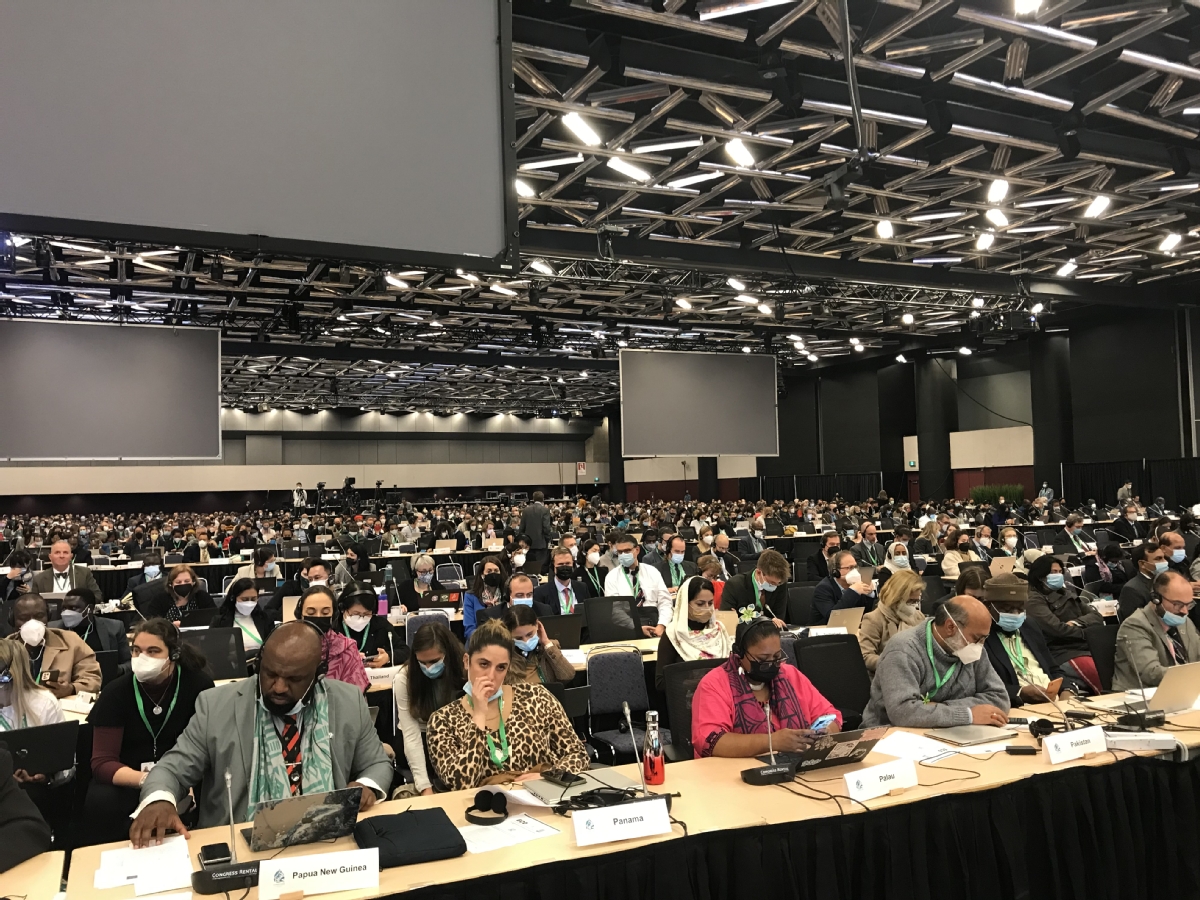As COP15 opens, 'the greatest consensus' on biodiversity sought
By LIU YINMENG in Montreal | chinadaily.com.cn | Updated: 2022-12-08 05:57

The 15th meeting of the United Nations Conference of the Parties (COP15) to the Convention on Biodiversity kicked off Wednesday with summit leaders calling for international cooperation to tackle rapidly declining nature and species extinction around the world.
In his opening remarks, Huang Runqiu, president of COP15 and China's minister of ecology and environment, stressed that biodiversity is at a crossroads and that action is urgently needed to address the issue. He praised the "joint efforts" by all parties and CBD Secretariat for making the conference possible.
"From today's meeting onward, I look forward to seeing the parties, international organizations and stakeholders demonstrate the spirit of international cooperation; show political determination and the utmost sincerity during the second phase of the meeting; fully demonstrate flexibility; and actively seek common ground on key issues," Huang said.
He called on all parties "to make positive political commitments" and to continue to increase international financial input to create favorable conditions for moving the consultations forward.
Huang also encouraged high-level representatives, such as ministers of countries, and heads of international organizations and institutions to focus on solving difficult issues, build "the greatest consensus" and inject political impetus to achieve the "landmark outcome of the conference", namely, the post-2020 Global Biodiversity Framework (GBF).
Huang's remarks were echoed by Elizabeth Maruma Mrema, executive secretary of the UN Convention on Biological Diversity, who urged "transformative change", "ambitions" and "commitments" to realize the convention's 2050 vision of "living in harmony with nature".

Mrema also expressed her gratitude to Huang and the Chinese government for their "tireless efforts".
"Through the global pandemic, you found a way for us to not only hold the first part of this COP last year but to also mobilize the commitment of the world through the Kunming Declaration," she said.
During a news conference at the COP15 on Wednesday, UN Secretary-General António Guterres called on governments to develop "ambitious national action plans" while also pushing Global North to increase funding for developing countries.
"We need developed countries to provide meaningful financial support for the countries of the Global South as custodians of the world's natural wealth following centuries of exploitation and loss," he said.
The UN chief thanked China for its leadership during a meeting with Huang on Tuesday, according to a news release from China's Ministry of Ecology and Environment.
Guterres spoke highly of China's work in biodiversity protection and climate change, "especially its practical efforts to promote and coordinate all parties as the president of COP15", it read.
COP15 is the biggest biodiversity conference in a decade, at which world leaders are expected to agree on a new Global Biodiversity Framework that aims to halt and reverse biodiversity losses by 2030.
The second part of COP15, which will be in Montreal until Dec 19, follows the first phrase of the meeting in Kunming in October 2021. China remains as the president of the conference that is themed "Ecological Civilization: Building a Shared Future for All Life on Earth."
Like other previous climate negotiations, one issue at stake is the lack of sufficient funding for developing countries to meet the global biodiversity targets.
Speaking on behalf of the African Union, a representative from Senegal highlighted the need for countries to "commit adequate financial resources" to protect biodiversity.
A delegate from Palau, who represented countries from the Asia-Pacific region, noted that the nations in the area "highly emphasize the need for adequate resource mobilization", she said, adding that the region welcomes the international funding for implementation of the GBF, including the Kunming Biodiversity Fund.
China launched the Kunming Biodiversity Fund during the first part of the COP15 in Kunming last year and pledged $230 million to it. The fund will help developing countries support biodiversity protection.
Most of the world's population resides in the Asia-Pacific region, where countries range from large to small, from landlocked to big ocean states. As a result, there is a divergence of views and opinions among the nations, the Palau delegate said.
"But as a region, we believe that this GBF is an important strategy that can set the world on the path to ensuring its survival, and we are committed to work with other regions to shape the future of global biodiversity in the next couple of weeks," she added.























